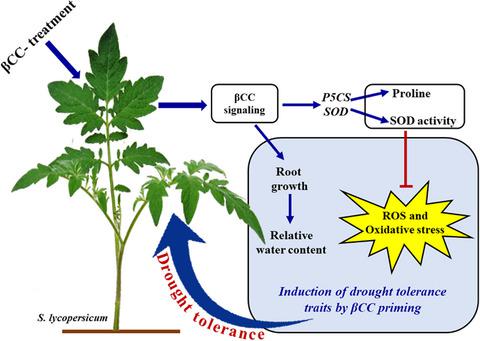当前位置:
X-MOL 学术
›
Plant Biol.
›
论文详情
Our official English website, www.x-mol.net, welcomes your feedback! (Note: you will need to create a separate account there.)
Exogenous β‐cyclocitral treatment primes tomato plants against drought by inducing tolerance traits, independent of abscisic acid
Plant Biology ( IF 3.9 ) Pub Date : 2020-11-11 , DOI: 10.1111/plb.13210 S. Deshpande 1 , R. Manoharan 1 , S. Mitra 1
中文翻译:

β-环柠檬醛外源处理通过诱导耐受性状(与脱落酸无关)使番茄植株抗旱
更新日期:2020-12-28
Plant Biology ( IF 3.9 ) Pub Date : 2020-11-11 , DOI: 10.1111/plb.13210 S. Deshpande 1 , R. Manoharan 1 , S. Mitra 1
Affiliation

|
- Drought is the most devastating stress for crops. Intensity and duration of drought determine the magnitude of plant damage; similarly, plant ability to counteract drought determines its tolerance capacity. Recent studies revealed that exogenous apocarotenoid treatment confers abiotic stress tolerance to plants. However, much less is known about the role of β‐cyclocitral (βCC), the major apocarotenoid, in drought tolerance. Here, we demonstrate βCC’s role in improving plants' tolerance against drought stress.
- Tomato (Solanum lycopersicum L.) plants were independently treated with water and βCC and grown under either water‐limited or irrigated conditions. The βCC‐treated drought‐exposed (BD) and βCC‐treated irrigated (BH) plants were analysed for the major drought tolerance associated traits; water‐treated drought‐exposed (CD) and water‐treated irrigated plants (CH) were used as controls.
- On exposure to drought, unlike controls, βCC‐treated plants showed no wilting, higher RWC and stomatal conductance, unchanged ABA levels and stomatal closure. The BD plants had increased photosynthesis, chlorophyll content and enhanced root, but not shoot, growth. In addition, βCC treatment enhanced proline accumulation and activity of SOD in both drought‐exposed and well irrigated plants.
- Taken together, βCC was identified as a potential candidate that improves tomato osmolyte accumulation and superoxide elimination, independent of ABA, and prepares the plant for upcoming drought stress. Our results suggest that βCC can be used to prime crops against drought stress.
中文翻译:

β-环柠檬醛外源处理通过诱导耐受性状(与脱落酸无关)使番茄植株抗旱
- 干旱是农作物最具破坏力的压力。干旱的强度和持续时间决定了植物的危害程度。同样,植物抵抗干旱的能力决定了其抗旱能力。最近的研究表明,外源性类胡萝卜素处理赋予植物非生物胁迫耐受性。然而,关于主要的类胡萝卜素β-环柠檬醛(βCC)在抗旱性中的作用还知之甚少。在这里,我们证明了βCC在提高植物对干旱胁迫的耐受性中的作用。
- 番茄(Solanum lycopersicum L.)植物分别用水和βCC处理,并在缺水或灌溉条件下生长。分析了βCC处理的干旱暴露(BD)和βCC处理的灌溉(BH)植物的主要耐旱性状。以水处理过的干旱(CD)和水处理过的灌溉植物(CH)作为对照。
- 与对照不同,在干旱条件下,经βCC处理的植物没有萎,RWC和气孔导度更高,ABA水平不变且气孔关闭。BD植物具有增加的光合作用,叶绿素含量和增强的根生长,但没有芽生长。此外,βCC处理在干旱和灌溉良好的植物中均提高了脯氨酸的积累和SOD的活性。
- 两者合计,βCC被认为是潜在的候选物,可独立于ABA改善番茄渗透液的积累和消除超氧化物,并为即将发生的干旱胁迫做好准备。我们的结果表明,βCC可以用于抗旱作物。



























 京公网安备 11010802027423号
京公网安备 11010802027423号